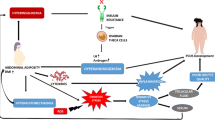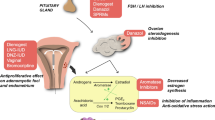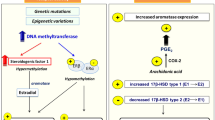Abstract
Background: Prostate-specific antigen (PSA) is expressed in many female tissues and its concentrations were higher in hirsute subjects. We aimed to determine serum PSA level in hirsute women and evaluate the effect of flutamide+ desogestrel/ethynil estradiol combination. Subjects and study design: Thirty patients with polycystic ovary syndrome (PCOS) and 30 healthy controls were studied. Hirsutism was defined by modified Ferriman-Gallwey score (FGS). Free androgen index (FAI) was used for hyperandrogenism. Patients received flutamide (500 mg/d) and oral contraceptive (desogestrel+ethinyl estradiol) for 9 months. Results: Mean FGS (p<0.0001), insulin (p<0.01), FAI (0.0001), androstenedione (p<0.0001), LH (p<0.05), and free testosterone (p<0.003) levels of patients with PCOS were higher than the control group. Mean serum total and free PSA level of PCOS patients were higher than the control group (p<0.0001 and p<0.0001). We found a positive correlation between total PSA levels and FGS (r=0.568, p<0.001), FAI and FGS (r=0.456 and p<0.01). There was also a positive correlation between FAI and total PSA (r=0.503 and p<0.005). At the end of treatment, FGS, androstenedione, free and total testosterone, FAI, serum PSA and LH levels decreased significantly [serum total PSA was 0,0208±0,0178 ng/ml at baseline and 0,0061±0,0044 ng/ml after treatment (p<0.0001)]. Conclusions: 1. Serum prostate specific antigen level is higher in patients with PCOS; 2. There is a positive correlation among FGS, FAI and PSA levels; 3. Serum PSA levels decrease with antiandrogen treatment; 4. Serum PSA mea-surement might be a marker for hirsutism.
Similar content being viewed by others
References
Knochenhauer ES, Key TJ, Kahsar-Miller M, Waggoner W, Boots LR, Azziz R. Prevalence of the polycystic ovary syndrome in unselected black and white women of the southeastern United States: a prospective study. J Clin Endocrinol Metab 1998, 83: 3078–82.
Ferriman D, Gallwey JD. Clinical assessment of body hair growth in women. J Clin Endocrinol Metab 1961, 21: 1440–7.
Muderris II, Bayram F. Clinical efficacy of lower dose flutamide 125 mg/day in the treatment of hirsutism. J Endocrinol Invest 1999, 22: 165–8.
Falsetti L, Gambera A, Platto C, Legrenzi L. Management of hirsutism. Am J Clin Dermatol 2000, 1: 89–99.
Negri C, Tosi F, Dorizzi R, et al. Antiandrogen drugs lower serum prostate-specific antigen (PSA) levels in hirsute subjects: evidence that serum PSA is a marker of androgen action in women. J Clin Endocrinol Metab 2000, 85: 81–4.
Yu H, Berkel H. Prostate-specific antigen (PSA) in women. J La State Med Soc 1999, 151: 209–13.
Melegos DN, Yu H, Ashok M, Wang C, Stanczyk F, Diamandis EP. Prostate-specific antigen in female serum, a potential new marker of androgen excess. J Clin Endocrinol Metab 1997, 82: 777–80.
Diamandis EP, Yu H. Nonprostatic sources of prostatespecific antigen. Urol Clin North Am 1997, 24: 275–82.
Homburg R. Polycystic ovary syndrome - from gynaecological curiosity to multisystem endocrinopathy. Hum Reprod 1996, 11: 29–39.
Vermeulen A, Verdonck L, Kaufman JM. A critical evaluation of simple methods for the estimation of free testosterone in serum. J Clin Endocrinol Metab 1999, 84: 3666–72.
Manetti L, Lupi I, Bogazzi F, et al. Prostate-specific antigen is increased in female patients with Cushing’s disease. J Endocrinol Invest 2002, 25: RC29–31.
Obiezu CV, Scorilas A, Magklara A, et al. Prostate-specific antigen and human glandular kallikrein 2 are markedly elevated in urine of patients with polycystic ovary syndrome. J Clin Endocrinol Metab 2001, 86: 1558–61.
Simard J, Luthy I, Guay J, Belanger A, Labrie F. Characteristics of interaction of the antiandrogen flutamide with the androgen receptor in various target tissues. Mol Cell Endocrinol 1986, 44: 261–70.
Darney PD. The androgenicity of progestins. Am J Med 1995, 98: 104S–10.
Moghetti P, Castello R, Negri C, et al. Flutamide in the treatment of hirsutism: long-term clinical effects, endocrine changes, and androgen receptor behavior. Fertil Steril 1995, 64: 511–7.
Dodin S, Faure N, Cédrin I, et al. Clinical efficacy and safety of low-dose flutamide alone and combined with an oral contraceptive for the treatment of idiopathic hirsutism. Clin Endocrinol (Oxf) 1995, 43: 575–82.
Ciotta L, Cianci A, Marletta E, Pisana L, Agliano A, Palumbo G. Treatment of hirsutism with flutamide and a low-dosage oral contraceptive in polycystic ovary syndrome. Fertil Steril 1994, 62: 1129–35.
Author information
Authors and Affiliations
Corresponding author
Rights and permissions
About this article
Cite this article
Bahceci, M., Bilge, M., Tuzcu, A. et al. Serum prostate specific antigen levels in women with polycystic ovary syndrome and the effect of flutamide+desogestrel/ethinyl estradiol combination. J Endocrinol Invest 27, 353–356 (2004). https://doi.org/10.1007/BF03351061
Accepted:
Published:
Issue Date:
DOI: https://doi.org/10.1007/BF03351061




